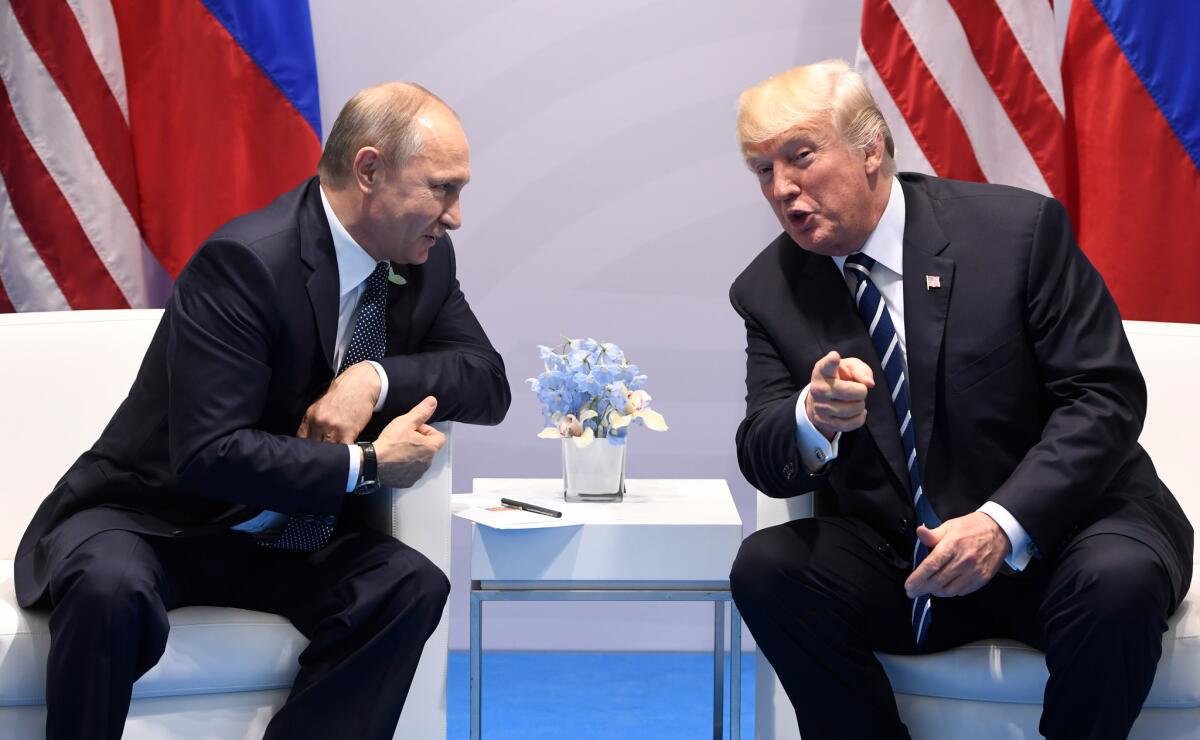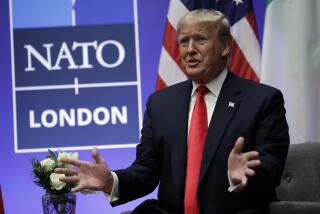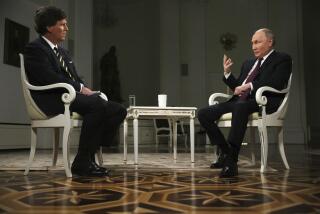Trump meets Putin, and Russia claims he accepted its denials of U.S. election interference

President Trump and Russian President Vladimir Putin agreed in their first face-to-face encounter, a lengthy and amicable meeting Friday, to look beyond the controversy over Russia’s attempts to sway the 2016 U.S. campaign and “find a way to go forward.”
That was Secretary of State Rex Tillerson’s upbeat take on the meeting. But the two sides offered contrasting accounts of the discussion of election meddling between the leaders, injecting new controversy into a saga that has shadowed Trump and put him at the center of an ongoing criminal investigation.
Trump raised the issue at the outset of a meeting that exceeded two hours. Putin denied any Russian interference and demanded proof, both sides agreed. But Russian Foreign Minister Sergei Lavrov, who joined the presidents along with Tillerson, told reporters that Trump accepted Putin’s denial — an act that would have the American president taking sides against his intelligence agencies, which have unanimously concluded that Russia, and Putin himself, were behind the election interference.
“Not a single fact has been presented,” Lavrov said. “President Trump has said that he has heard clear declarations from Mr. Putin that Russian leadership and Russian government has not interfered in the elections.”
Lavrov also said Trump called the lingering controversy “strange and bizarre.”
The White House did not publicly dispute Lavrov’s claim, nor did aides respond to requests for clarification.
Tillerson told reporters that Trump began the discussions by “raising the concerns of the American people regarding Russian interference” in the American political process, which was followed by a “robust” and “lengthy discussion of the matter.”
Trump and Putin agreed that the controversy was a “substantial hindrance in the ability to move the U.S.-Russian relationship forward,” Tillerson said.
“There was not a lot of re-litigating of the past,” he added. “I think both of the leaders feel like there’s a lot of things in the past that both of us are unhappy about.”
White House aides had been circumspect about the agenda leading up to Friday’s formal bilateral meeting on the sidelines of the Group of 20 leaders’ summit here, acknowledging at one point that the topics would be “whatever the president wants to talk about,” as national security advisor H. R. McMaster put it last week.
Ultimately the conversation covered a range of other issues, officials said, including Ukraine, where Russian aggression has drawn international sanctions; Syria, where Russia and Iran prop up the Assad regime that the U.S. opposes; North Korea, where Russia’s economic interests make it less eager than Trump to counter Pyongyang’s nuclear threats; terrorism and cybersecurity.
It was announced Friday that the two nations along with Jordan had brokered a cease-fire agreement in the southwest of Syria to take effect Sunday — an indication, Tillerson said, of what is possible when Russia and the U.S. cooperate on areas of mutual concern.
Talks went well beyond the scheduled 30 minutes — not surprising given past encounters between Putin and U.S. presidents. But it was nonetheless notable given the scrutiny on this one, taking place against the backdrop of multiple investigations by the FBI and Congress into Russian involvement in the 2016 election and potential collusion involving former and current Trump aides.
Trump and Putin had exchanged cordial if lukewarm greetings in front of reporters before launching into the meeting, which included only the two presidents, Tillerson, Lavrov and two translators. At one point, Putin, who has been implicated in the deaths of journalists in Russia, pointed to the assembled reporters to ask if they were the ones who had “insulted” Trump. The president nodded and laughed in agreement.
“We look forward to a lot of very positive things happening for Russia, and for the United States and for everybody concerned. And it’s an honor to be with you,” Trump said at the start of the meeting.
Putin said he was “delighted” for the chance to meet, following multiple conversations by phone earlier this year.
“If you want to have a positive outcome in bilaterals and be able to resolve most international policy issues, that will really need personal meetings,” Putin said.
The two presidents decided to put together a “framework” to monitor cyber attacks and evaluate who should be “held accountable,” Tillerson said. Lavrov indicated that progress was not made on a Russian demand that the United States return two diplomatic compounds, one in Maryland and another in New York, that had been used by Russian spies and were seized in December as part of the Obama administration’s sanctions for Moscow’s election interference.
They reached no agreement on North Korea. On Ukraine, at Putin’s request, Trump has appointed a special representative to engage in discussions. A day earlier, in a visit to Warsaw, Trump called publicly for Russia to “cease its destabilizing activities in Ukraine and elsewhere.”
“Both presidents were driven by their national interests, and they also both understood that both countries can do this only if we search for a balance between the interests of our two countries and if we want to maintain stability,” Lavrov said.
The Russian foreign minister spoke to reporters soon after the presidents’ meeting. Tillerson addressed U.S. reporters later, with no cameras allowed and audio released only after the briefing ended.
The Russians’ more public attempt to shape the narrative of the meeting came just two months after when Lavrov and the Russian ambassador to the U.S. at the time, Sergey Kislyak, visited the White House, a day after Trump had fired the FBI director out of frustration with the Russia investigation. U.S. officials were blindsided by the Russian state news agency’s release of photos of the visit, which showed Trump and the Russians in jovial conversation.
Dana Perino, a former press secretary to President George W. Bush, wrote on Twitter that being the first to describe a meeting to reporters is an “excellent practice” after any meeting with a foreign leader and “avoids distortion” by the other side.
Trump has repeatedly dismissed questions over Russia’s role in his victory as a “witch hunt” to de-legitimize his election and undermine his agenda. But Trump himself has often added to the controversy with his own statements.
As world leaders prepared to meet on weighty issues of trade, climate change and energy policy, Trump wrote on Twitter that “everyone” at the summit was talking about former Hillary Clinton campaign chairman John Podesta and the investigation into his hacked emails.
Democrats condemned Trump for appearing not to challenge Putin over his reported claim of innocence in the U.S. election.
“President Trump had an obligation to bring up Russia’s interference in our election with Putin, but he has an equal obligation to take the word of our intelligence community rather than that of the Russian president,” Senate Minority Leader Charles E. Schumer (D-N.Y.) said in a statement.
“For Secretary Tillerson to say that this issue will remain unresolved is disgraceful,” Schumer added. “To give equal credence to the findings of the American Intelligence Community and the assertion by Mr. Putin is a grave dereliction of duty and will only encourage Russia to further interfere in our elections in the future.”
The meeting was celebrated as a victory on Russian state media.
“Russia is now a major consideration in world affairs and will be consulted from now on,” said one commentator on the Russia One television news program. “I am reminded of the meeting on the River Elbe,” another commentator said, referencing the historic handshake between American and Soviet soldiers on that German river in 1945 after vanquishing Nazi German forces.
Earlier in the day Maxim Oreshkin, Russia’s minister for economic development, told journalists about an interaction between the two leaders prior to the two-hour meeting that included a short but pointed discussion about justice and fairness in world trade.
“When the president of the Russian Federation spoke,” Oreshkin said of Putin, “he gave President Trump a little bit of a jab, saying that President Trump talks about justice in international trade, but what kind of justice can be said in the situation when there are financial constraints and trade restrictions?”
Putin’s comment reflected his displeasure about U.S. and European sanctions against Russia for Moscow’s annexation of Crimea and aggression elsewhere in Ukraine.
Bennett reported from Hamburg and Memoli from Washington. Special correspondent Sabra Ayres contributed from Moscow.
For more White House coverage, follow @ByBrianBennett and @mikememoli on Twitter.
ALSO
Protesters outside G-20 summit violently confront riot police in port city of Hamburg
Robert Mueller’s team has prosecuted high-stakes cases — including obstruction of justice
Europe’s leaders stepping into bigger role on global trade and climate change
Get live updates on our Essential Washington news feed
More to Read
Get the L.A. Times Politics newsletter
Deeply reported insights into legislation, politics and policy from Sacramento, Washington and beyond. In your inbox three times per week.
You may occasionally receive promotional content from the Los Angeles Times.








